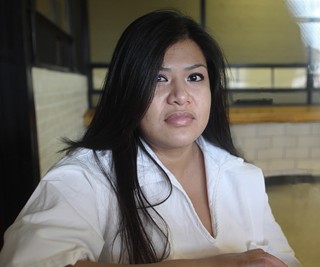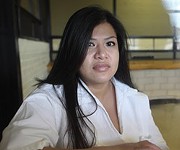New Trial Denied in Choking Case
Appeals court overturned ruling granting new trial for babysitter
By Jordan Smith, Fri., May 4, 2012
The Court of Criminal Appeals on April 25 denied the appeal of Rosa Jimenez, overturning a lower court ruling that granted her a new trial in Travis County's infamous paper towel choking case. Jimenez could not prove she was wrongfully convicted, the court ruled in an opinion authored by Judge Cathy Cochran; more importantly, the court concluded that the law does not require a defendant to be given access to a team of experts to mount a defense – even if the prosecution has access to a multidisciplinary team of experts. And on that point, argues Jimenez's lawyer Bryce Benjet, the court is absolutely wrong.
Jimenez was convicted and sentenced to 99 years in prison for the death of toddler Bryan Gutierrez, whom she was babysitting in January 2003 when prosecutors say she shoved a wad of five paper towels down his throat, choking him. Gutierrez died that April.
At trial, local doctors and medical professionals who treated Gutierrez insisted the only way to explain the paper in the toddler's throat was that it was deliberately placed there. But at a hearing in December 2010, Benjet brought in a host of medical experts who disagreed, saying the injury looked similar to other toddler chokings they'd seen and that the incident was likely a tragic accident.
Former Travis County Judge Charlie Baird agreed and issued an opinion that Jimenez's conviction should be thrown out and she should be given a new trial. Baird found that Benjet's experts were a credible counter to the expert evidence offered by the state at trial. Had Jimenez's jury heard any alternate theory of the crime, it is unlikely that the verdict would have been the same, Baird opined, concluding that Jimenez had been denied due process and that her attorney, veteran defender Leonard Martinez, had rendered ineffective assistance to his client.
The CCA, however, disagreed on all points – arguing that Martinez did not render ineffective assistance, nor were there any due process violations. Indeed, a defendant does not have a right to a contingent of experts (paid for by taxpayers) to match those that the state has at its disposal (also paid for by taxpayers), the court ruled. "In an ideal world, it might well be wise to have an equal number of experts on each side of a lawsuit, each one matching the skill and experience of his opposing expert," the court wrote. Jimenez "makes a compelling argument that she was outclassed and outmatched by the State's numerous experts. But the issue before us is whether the constitution requires that an indigent defendant be provided with an absolute (or even rough) equivalency of experts when the primary contested issue at trial involves the cause of death," the ruling continues. "Instead, we must conclude that applicant does not have a constitutional right to a 'team of experts' paid for by the taxpayers, and applicant's counsel is not ineffective in failing to request such a team."
Benjet said he's disappointed by the ruling, which he believes appears to have been written to conform with a previously determined outcome to deny relief. "When you're writing the opinion, you get to control the facts," he said. "If you find a troubling fact that doesn't meet a result that has been predetermined, you pretend it's not there and the opinion reads great." He believes the court is simply "wrong on the law" – especially in ruling about the duty to provide experts for the defense. It's "about giving a defendant the tools they need to mount a defense," he said. In Jimenez's case, the state had a team of doctors with different specialties testify about whether Gutierrez could have stuffed the paper towels in his own mouth; they agreed that was not possible. In her defense, Jimenez had just one expert, forensic pathologist Ira Kanfer, who admitted on the stand that he did not have the expertise to determine whether Gutierrez had been abused, nor did he have the experience in child development to determine whether the toddler would have had the skill to get the papers down his own throat. Simply put, Jimenez was outmatched. "You cannot present a defense without access," Benjet argues. But the court instead decided "that Dr. Kanfer was good enough."
Benjet has already filed an appeal in federal district court, and he's waiting for the case to be assigned a judge. "We strongly believe that Rosa Jimenez is innocent," he said, "and we will pursue every remedy that is available to exonerate her."
Read the court's complete ruling here.
Got something to say on the subject? Send a letter to the editor.











